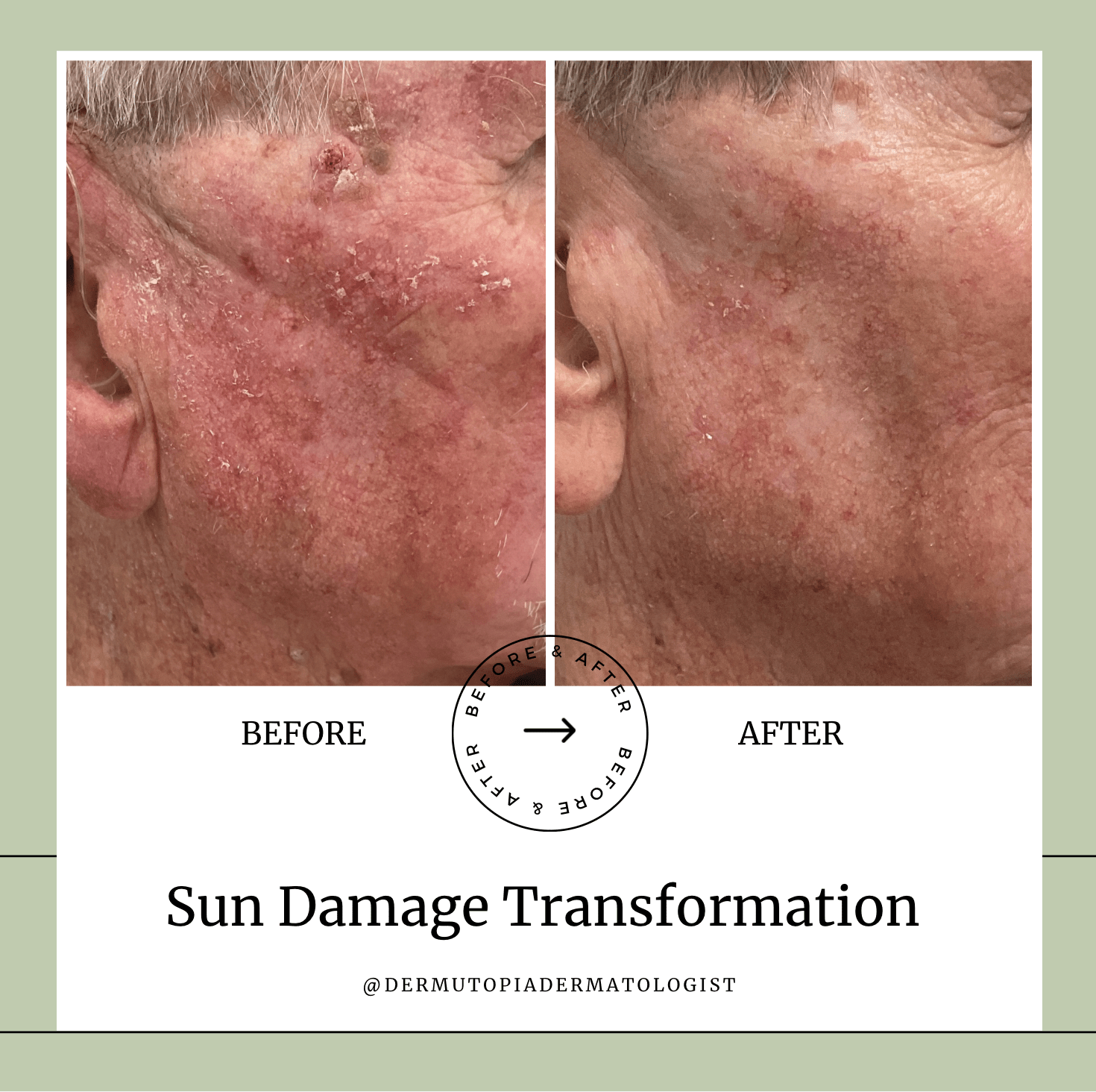Skin Cancer Prevention
At DermUtopia, we encourage our patients to have a full body skin exam at least once a year for skin cancer prevention. Skin exams may be more frequent depending on history of skin cancer and sun exposure. Some of the most common types of skin cancers that Dr. Dintiman screens for include Basal Cell Carcinomas, Squamous Cell Carcinomas, Melanomas, and Actinic Keratoses (precancerous skin lesions).

Actinic Keratoses
Actinic Keratoses (AKs) are precancerous skin lesions that are often rough, red, and scaly. Some patients notice that AKs feel sharp and prickly when touched. AKs can be found anywhere on the body where sun damage has occurred. Treating AKs are important as these precancerous lesions could turn into skin cancer. Freezing AKs with liquid nitrogen or use of chemotherapeutic creams such as Effudex are effective treatments.
If you have a suspicious skin lesion, call, or text (703) 229-2544 to schedule an appointment with us today.
Basal Cell Carcinoma
Basal Cell Carcinoma (BCC) is the most common form of skin cancer and is slow growing. BCCs usually develop due to sun damage. BCCs are most likely to be found in areas that have had a lot of sun exposure such as the face, ears, hands, and legs.
BCCs are diagnosed with a simple biopsy procedure. Depending on the size and severity of the BCC, surgical excisions, or Mohs surgery may be considered. If you have a suspicious skin lesion, call, or text (703) 229-2544 to schedule an appointment with us today.
Melanoma
Melanoma is a serious form of skin cancer that arises from an abnormal growth of melanocytes (pigment cells). Melanocytes produce melanin proteins which function to protect the skin by absorbing UV radiation.
Melanoma commonly present as:
- black, grey, or pink (often a spot with a combination of colors)
- irregular in shape as compared to other moles on the body
- may start as a new freckle or mole that itches or bleeds.
Melanomas can appear anywhere on the body, and can occur in adults of all ages, but is rare in children.
Melanoma can be divided into three main types:
- In situ: confined to specific spot in the top layer of the skin (the epidermis)
- Invasive: tumor has spread into a deeper layer of the skin (the dermis)
- Metastatic: tumor has spread to other tissues
Risk factors for a Melanoma may include:
- Increasing age
- Personal or family history of melanomas and other skin cancers
- Excessive sun exposure over a lifetime
- Fair skin, blue eyes, and blonde or red hair
- Multiple pigmented moles
- Parkinson’s Disease
Always look for color and change in the size of the moles on your body.
If you have a suspicious skin lesion, call, or text (703) 229-2544 to schedule an appointment with us today.
Squamous Cell Carcinoma
Cutaneous squamous cell carcinoma (SCC) is a common type of non-melanoma skin cancer. SCCs come from cells within the epidermis that make keratin which normally function to support the skin, hair, and nails.
SCCs present as scaly or crusted lumps that are often pink, yellow, and white in color. They often grow over weeks to months and may be painful to the touch. SCCs are most likely to be found in areas that have had a lot of sun exposure such as the face, ears, hands, and legs.
Risk factors for SCCs may include:
- Excessive sun exposure over a lifetime (i.e., skin tanning, outdoor occupations)
- History of actinic keratoses
- Fair skin, blue eyes, and blonde or red hair
- Smoking
- Radiation
SCCs are diagnosed with a simple biopsy procedure. Depending on the size and severity of the SCC, topicals, surgical excisions, or Mohs surgery may be considered. If you have a suspicious skin lesion, call, or text (703) 229-2544 to schedule an appointment with us today.
If you have a suspicious skin lesion, call, or text (703) 229-2544 to schedule an appointment with us today.
